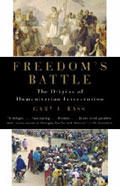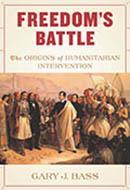The Origins of Humanitarian Intervention

The New York Times 100 Notable Books of 2008.
The Washington Post Best Books of 2008.
"Gary J. Bass has written a wonderfully intelligent and sardonic history …. Bass expertly brings to life a rich panoply of characters …. Freedom's Battle is full of fascinating and ironic incident .… A spirited and elegant contribution to the moral history of humanitarian emotions …. Thanks to Bass's fine book, we can uncover the lineage of some enduring intuitions about the duties that people owe each other across borders."
—Michael Ignatieff, The New Republic
"[A] vivid new exploration of the historical roots of modern-day humanitarian intervention ... . Bass ... rebuts the notion that civilian suffering only recently assumed an influential role in world affairs. He tells colorful tales of popular human rights and humanitarian campaigns in the 19th century, unearthing a cast of familiar personalities who played unheralded roles as social activists .... As he did in his last book, Stay the Hand of Vengeance, a riveting history of war crimes trials, Bass moves convincingly from the present to the past."
—Samantha Power, Slate
"A cool, erudite, historical view. … The result is a delight. His book is full of fascinating quotations and anecdotes … and draws vivid parallels with recent events in Georgia, Darfur and Kosovo. History may not repeat itself exactly, but the arguments are often strikingly similar."
—The Economist
"[An] engaging history .... Compelling ... Rich with accounts of parliamentary debate and battlefield confrontation .... Bass's thesis that humanitarianism long preceded the crises of Bosnia and Rwanda is persuasive."
—The New Yorker
"An absorbing, well-researched, and frequently amusing book .... Bass provides a trove of fresh material, as well as fresh insight, concerning this exciting period .... Bass has a considerable gift of phrase .... He also has a jaunty flair for recognizing such cynicism."
—Christopher Hitchens, Foreign Affairs
"Lively, subtle and comprehensive ... Sheds a penetrating light on current policy debates. ... Bass's sense of nuance constitutes the strength of this book, which has the force of a polemic without descending to one."
—Robert D. Kaplan, The Washington Post

"Mr. Bass relates these episodes masterfully, providing a wealth of detail in fluid prose. Although he aims to make a point—about the legitimacy of humanitarian intervention—his accounts are full and fair-minded. Freedom's Battle is a pleasure for the learning one can take away from it and for the opportunity to reflect on how much things have changed since the 19th century, and how much, in certain ways, they have not."
—The Wall Street Journal
"Freedom's Battle is an impressively researched and engagingly written history of early humanitarian intervention."
—David Armitage, TLS
"Bass tells the strange, bloody tales of these now nearly forgotten campaigns with extraordinary verve and wit, especially for a Princeton political-science wonk. But the book's real payoff is what it brings to our understanding of contemporary conflicts."
—Lev Grossman, Time
"A thorough and lively book ... Engaging ... . He takes a balanced approach ... . Barack Obama could learn a lot from Freedom's Battle about how to restore the country's moral leadership in the world."
—The Boston Globe
"[An] eye-opening new history of humanitarian intervention. ... HIGHBROW BRILLIANT."
—New York
(Click here to see the Approval Matrix)
"A lively narrative history .... Fascinating and well told .... Bass .... writes with a jaunty flair and an eye for eccentric characters."
—Adam Hochschild, The New York Times Book Review
"Delightful wit, insight and scholarship …. Readers will relish Bass's gripping account of bloodthirsty characters, bitter political infighting and cynical leaders, forced by public opinion into moral actions that did not serve their own national interest."
—Publisher's Weekly (starred review)
"A timely, enlightening and gripping book. ... The very best kind of historical writing, Bass's work is lively, moving, deep, and full of insights for today's challenges."
—Library Journal
"This fresh, fascinating history will be sought out by those engaged in current debates over interventionism."
—Booklist
"Gary Bass is one of the country's most important scholars working on the politics of human rights. Freedom's Battle is a brilliant book—meticulously researched, surprising, nuanced, and remarkably entertaining."
—Steve Coll, Pulitzer Prize-winning author of Ghost Wars
"In Freedom's Battle, Gary Bass takes hold of what is perhaps the most vitally important of contemporary foreign policy questions—when is a nation justified, for humanitarian reasons, to intervene abroad?—and traces its roots deep into the rich soil of recent history. As Bass shows by his fascinating historical detective work, this painful question has dogged leading Western statesmen for more than a century. How they answered it, as Bass shows in rich detail, has a great deal to teach us today. This is a gripping and important book."
—Mark Danner, author of The Massacre at El Mozote and Torture and Truth
"Gary Bass has written an innovative book that broadens the idea of humanitarian intervention. Though we might like to regard contemporary anti-genocide campaigns as unique achievements of our times, Freedom's Battle offers a striking and original argument that activists and politicians of the nineteenth century paved the way with a series of interventions to stop the slaughter of innocents. Bass's new and provocative reading of nineteenth-century political history teaches us how to better react to the genocides in our world."
—Peter Maass, author of Love Thy Neighbor: A Story of War
Order from Knopf here
Order from Barnes & Noble here
Why do we sometimes let evil happen to others and sometimes rally to stop it? Whose lives matter to us? These are the key questions posed in this important and perceptive study of the largely forgotten nineteenth-century "atrocitarians"—some of the world's first human rights activists. Wildly romantic, eccentrically educated, and full of bizarre enthusiasms, they were also morally serious people on the vanguard of a new political consciousness. And their legacy has much to teach us about the human right crises of today.
Gary Bass shatters the myth that the history of humanitarian intervention began with Bill Clinton, or even Woodrow Wilson, and shows, instead, that there is a tangled international tradition, reaching back more than two hundred years, of confronting the suffering of innocent foreigners. Bass describes the political and cultural landscapes out of which these activists arose, as a newly emergent free press exposed Europeans and Americans to atrocities taking place beyond their shores and galvanized them to act. He brings alive a century of passionate advocacy in Britain, France, Russia, and the United States: the fight the British waged against the oppression of the Greeks in the 1820s, the huge uproar against a notorious massacre in Bulgaria in the 1870s, and the American campaign to stop the Armenian genocide in 1915. He tells the gripping stories of the activists themselves: Byron, Bentham, Madison, Gladstone, Dostoevsky, and Theodore Roosevelt among them.
Military missions in the name of human rights have always been dangerous undertakings. There has always been the risk of radical destabilization and the threatening blurring of imperial and humanitarian intentions. Yet Bass demonstrates that even in the imperialistic heyday of the nineteenth century, humanitarian ideals could play a significant role in shaping world politics. He argues that the failure of today's leading democracies to shoulder such responsibilities has led to catastrophes like those in Rwanda and Darfur—catastrophes that he maintains are neither inevitable nor traditional.
Timely and illuminating, Freedom's Battle challenges our assumptions about the history of morally motivated foreign policy, and sets out a path for reclaiming that inheritance with greater modesty and wisdom.

